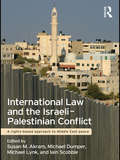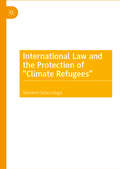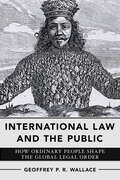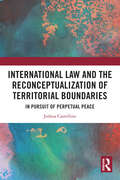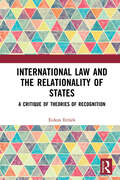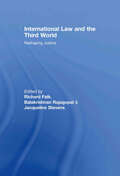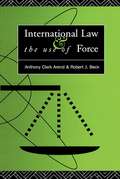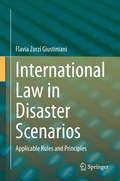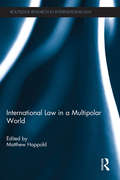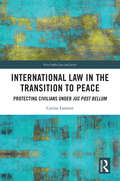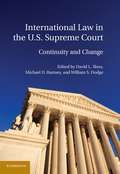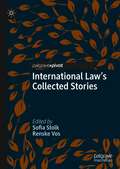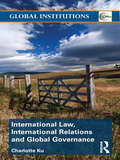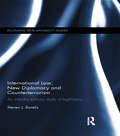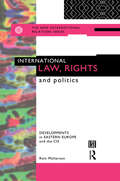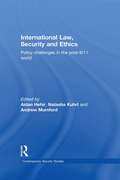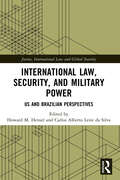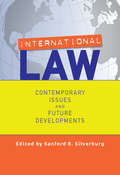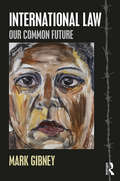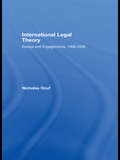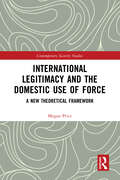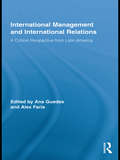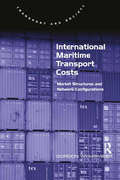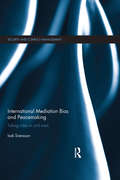- Table View
- List View
International Law and the Israeli-Palestinian Conflict: A Rights-Based Approach to Middle East Peace
by Susan M. AkramThe Israeli-Palestinian conflict has long been intertwined with, and has had a profound influence on, the principles of modern international law. Placing a rights-based approach to the Israeli-Palestinian conflict at the centre of discussions over its peaceful resolution, this book provides detailed consideration of international law and its application to political issues. Through the lens of international law and justice, the book debunks the myth that law is not useful to its resolution, illustrating through both theory and practice how international law points the way to a just and durable solution to the conflict in the Middle East. Contributions from leading scholars in their respective fields give an in-depth analysis of key issues that have been marginalized in most mainstream discussions of the Israeli-Palestinian conflict: Palestinian refugees Jerusalem security legal and political frameworks the future of Palestine. Written in a style highly accessible to the non-specialist, this book is an important addition to the existing literature on the subject. The findings of this book will not only be of interest to students and scholars of Middle Eastern politics, International Law, International Relations and conflict resolution, but will be an invaluable resource for human rights researchers, NGO employees, and embassy personnel, policy staffers and negotiators.
International Law and the Protection of “Climate Refugees”
by Giovanni SciaccalugaThis book studies the topic of forced climate migrants (commonly referred to as “climate refugees”) through the lens of international law and identifies the reasons why these migrants should be granted international protection. Through an analysis focused on climate change and human rights international law, it points out the legal principles and rules upon which an international obligation to protect persons forced to migrate due to climate change is emerging. Sciaccaluga advocates for a state obligation to protect climate migrants when their origin countries have become extremely environmentally fragile due to climate change—to the point of becoming unable to guarantee the exercise of inalienable human rights in their territories. Turning to the future, this book then investigates the current elements on which a “forced climate migrants law” could be built, ultimately arguing for the duty to provide some form of assistance to forced climate migrants in a third state within the international legal system.
International Law and the Public: How Ordinary People Shape the Global Legal Order
by Geoffrey P. WallaceIn International Law and the Public, Geoffrey P.R. Wallace investigates the public as a crucial, often overlooked, actor in international law. He asks just who is it that counts in the operation of the international legal order. Defying conventional wisdom that sees governments, leaders, generals, lawyers, or elites from the upper echelons of society as the main international legal players, Wallace advances a "popular international law" where ordinary people are considered important legal actors in their own right alongside the usual focus on elites. Far from powerless or unwitting, publics possess both the cognitive and material capacities to understand and contribute to the intricacies of international legal rules. Combining rigorous theorizing with wide-ranging evidence, International Law and the Public is an account of an international legal politics from below, taking seriously the place of ordinary people in international affairs.
International Law and the Reconceptualization of Territorial Boundaries: In Pursuit of Perpetual Peace
by Joshua CastellinoThis book critically analyzes the state-based regime of international law, eliciting its colonial and decolonial origins and proposing a new sub-regional basis for dealing with contemporary global challenges.Since 1648, public international law has taken many steps to maintain peace and establish a just order. The State is deemed central to each of these efforts. Yet modern challenges, such as environmental mitigation, mass migration, and the need to stimulate economic growth, overwhelm the State. Could a regional approach to these questions, achieved in conjunction with strong sub-national local governance, establish a more effective framework for systemic change? Drawing on a history of colonization and decolonization, while scrutinizing decisions made about the imposition of the State on the basis of colonial boundaries, this multidisciplinary work analyses why current challenges are unlikely to be adequately addressed through existing governance structures. In response, it advocates for a sub-regional, transnational approach, drawing on analyses of pre-colonial shared histories and contemporary population ethnographies unfettered by hegemonic boundary drawing. The book argues that collaboration across such frontiers in the face of climate and other challenges may offer more feasible approaches to the pursuit of peace than the unquestioned maintenance of state-based structures of inherited privilege.This book will appeal to scholars and others with interests in international law, international relations, and international politics, as well as in the history and politics of colonialism.
International Law and the Relationality of States: A Critique of Theories of Recognition
by Erdem ErtürkThis book critically engages with theories of the recognition of states under international law. Demonstrating that recognition is a constitutive relation that is imperative for the construction of international subjects, the book argues that prevalent theories of recognition fall short of accommodating this imperative. The book traces the source of this shortcoming to Vattel’s notion of absolute sovereignty. A paradox pertains to this notion as absolutely independent states seemingly come into being in a community which sets the law that determines statehood. The book shows how this paradox is reproduced in constitutive theorists’ idea of recognition as a sovereign gesture of consent and declarative theorists’ perception that states can come into being on a singular basis, without any need for interaction. This necessitates a rethinking of the role of recognition in a way that circumvents the problems generated by the notion of absolute independence, whilst accommodating the relational element of coming into being. To achieve this purpose, the book draws upon Hegel’s theory of recognition, supplementing it with Bataille’s and Derrida’s critical readings of Hegel’s thought. In this respect, the book departs from the restrictive economy of recognition that constantly recreates a paradoxical perception of sovereignty, elaborating a more general economy of recognition that accommodates the notion of subjects in flux. This critical engagement with a key notion in international law will appeal to legal and political theorists, as well as scholars and students in international relations.
International Law and the Third World: Reshaping Justice (Routledge Research in International Law)
by Jacqueline Stevens Richard Falk Balakrishnan RajagopalThis volume is devoted to critically exploring the past, present and future relevance of international law to the priorities of the countries, peoples and regions of the South. Within the limits of space it has tried to be comprehensive in scope and representative in perspective and participation. The contributions are grouped into three clusters to give some sense of coherence to the overall theme: articles by Baxi, Anghie, Falk, Stevens and Rajagopal on general issues bearing on the interplay between international law and world order; articles highlighting regional experience by An-Na’im, Okafor, Obregon and Shalakany; and articles on substantive perspectives by Mgbeoji, Nesiah, Said, Elver, King-Irani, Chinkin, Charlesworth and Gathii. This collective effort gives an illuminating account of the unifying themes, while at the same time exhibiting the wide diversity of concerns and approaches.
International Law and the Use of Force: Beyond the U.N. Charter Paradigm
by Robert J. Beck Anthony Clark ArendWhen the United Nations Charter was adopted in 1945, states established a legal `paradigm' for regulating the recourse to armed force. In the years since then, however, significant developments have challenged the paradigm's validity, causing a `pardigmatic shift'. International Law and the Use of Force traces this shift and explores its implications for contemporary international law and practice.
International Law in Disaster Scenarios: Applicable Rules and Principles
by Flavia Zorzi GiustinianiThe book identifies the main international concepts and rules that are of special relevance in disaster settings and critically analyses how they are implemented in such contexts. It shows that, although the crucial and growing importance of disaster response has resulted in a complex framework of international obligations, it is nonetheless guided by certain general principles/values. In particular, through an in-depth analysis of sovereignty, international cooperation and solidarity, and their manifestations in disaster contexts, the book assesses the concrete scope and nature of the obligations of the state affected by the disaster, and those of the international community, respectively. Considerable attention is devoted to the applicable legal framework governing disaster response in mixed situations of disaster and armed conflict, and to the main problems and operational challenges entailed by the involvement of foreign military personnel and assets in disaster response. The book’s overall objective is to provide an authoritative overview of the development, core issues and challenges in international law with regard to disaster scenarios, and to serve as a valuable and comprehensive reference guide.
International Law in a Multipolar World (Routledge Research in International Law)
by Matthew HappoldSince the creation of the United Nations in 1945, international law has sought to configure itself as a universal system. Yet, despite the best efforts of international institutions, scholars and others to assert theuniversal application of international law, its relevance and applicability has been influenced, if not directed, by political power.Today, the "decline of the West" and ascent of China and India poseparticular challenges for international law and institutions. The international system appears to be moving towards multipolarity, with various sites of power competing to exert influence in the world today. With contributors from a variety of countries providing perspectives from the disciplines of international law and international relations theory, International Law in a Multipolar World addresses the implications that multipolarity poses for the international legal system. Contributors including Jean d'Aspremont, Jörg Kammerhofer, Alexander Orakhelashvili, Christian Pippan and Nigel White, explore issues such as the use of force, governance and democracy, regionalism and the relevance of the United Nations in a multipolar world, while considering the overarching theme of the relationship between power and law. International Law in a Multipolar World is of particular interest to academics and students of public international law, international relations theory and international politics.
International Law in the Transition to Peace: Protecting Civilians under jus post bellum (Post-Conflict Law and Justice)
by Carina LamontThis book proposes a normative framework specifically designed for the complex and legally uncertain time period between armed conflicts and peace. As such, it contributes both to the furthering of a jus post bellum framework, and to enhanced legal clarity in complex and legally uncertain environments. This, in turn, contributes to strengthened protection engagements, and thus to improved prospects of enabling sustainable peace and security in both national and international perspectives. The book offers a novel but persuasive argument for a legal framework specific for transitional environments. Such legal framework, it is argued, is warranted in order to enable legal clarity to contemporary and outstanding legal issues, as well as to furthering peace efforts in complex environments. The legal framework suggested proposes a dividing line between applicable legal frameworks that, it is submitted, enhances both legal clarity on protection engagements and the quest for sustainable peace. The framework proposed is founded on a legal analysis of the protective nature and function of law. It thus provides a rare but important perspective on law that is of value in the quest for sustainable peace and security. The research draws uniquely on both contemporary legal debates, and on peace and conflict research. It does so in order to enable legal analysis that is both legally sound, as well as appropriate and adequate in today’s peace and security realities. The book provides a valuable resource for academics, researchers and policy-makers in the areas of Public International Law, International Humanitarian Law, International Human Rights Law, (the law of) Peace Operations, and Peace and Security Studies.
International Law in the U.S. Supreme Court
by Michael D. Ramsey William S. Dodge David L. SlossFrom its earliest decisions in the 1790s, the U.S. Supreme Court has used international law to help resolve major legal controversies. This book presents a comprehensive account of the Supreme Court's use of international law from the Court's inception to the present day. Addressing treaties, the direct application of customary international law and the use of international law as an interpretive tool, the book examines all the cases or lines of cases in which international law has played a material role, showing how the Court's treatment of international law both changed and remained consistent over the period. Although there was substantial continuity in the Supreme Court's international law doctrine through the end of the nineteenth century, the past century was a time of tremendous doctrinal change. Few aspects of the Court's international law doctrine remain the same in the twenty-first century as they were two hundred years ago.
International Law's Collected Stories (Palgrave Studies in International Relations)
by Sofia Stolk Renske VosThis edited volume presents a collection of stories that experiment with different ways of looking at international law. By using different literary lenses -namely, storytelling, the novel, the drama, the collage, the self-portrait, and the museum- the authors shed light on elements of international law that usually remain unseen or unheard and expose the limits of what international law can do. We inquire into who the storytellers of international law are, the stages on which they tell their stories, and who are absent in these tales. We present it as a collection: a set of different essays that more or less deal with the same subject matter. Alternatively, we would like to call it a potpourri of stories, since the diversity of topics and approaches is eclectic and unconventional. By placing multiple perspectives alongside each other we aim to compare and contrast, to allow for second thoughts, and to rediscover. In doing so, we engage with the ambiguities of international law’s characters and spaces, and with the worldviews they reflect and worlds they create.
International Law, International Relations and Global Governance: The International Law And International Relations Toolbox (Global Institutions)
by Charlotte KuInternational Relations and International Law have developed in parallel but distinctly throughout the 20th Century. However in recent years there has been recognition that their shared concerns in areas as diverse as the environment, transnational crime and terrorism, human rights and conflict resolution outweigh their disciplinary and methodological divergences. This concise and accessible volume focuses on collaborative work within the disciplines of international law and international relations, and highlights the need to develop this collaboration further, describing the value for individuals, states, IGOs, and other non-state actors in being able to draw on the cross-pollination of international relations and international legal scholarship. This book: examines how different elements of governance are interacting and shifting from one actor to another analyses the cumulative effect of these shifts, and evaluates how they both enhance and challenge the worlds governing capacity considers how the characteristics of an architecture for a globalized governance are emerging. Helping readers to examine and understand how accumulated actions over time have given rise to system-wide changes, this work is essential reading for all students of international law, international relations and global governance.
International Law, New Diplomacy and Counterterrorism: An interdisciplinary study of legitimacy (Routledge New Diplomacy Studies)
by Steven J. BarelaThis interdisciplinary book explores how terrorism is meant to target a government’s legitimacy, and advocates for sounder defensive measures when countering international attacks. The dramatic increase in global cooperation throughout the twentieth century—between international organisations and their state missions of diplomats, foreign officers, international civil servants, intelligence officers, military personnel, police investigators, judges, legislators, and financial regulators—has had a bearing on the shape and content of the domestic political order. The rules that govern all of these interactions, and the diplomats engaged to monitor and advocate for compliance, have undergone a mushrooming development following the conclusion of each world war. This dramatic growth is arguably the most significant change the international structure has experienced since the inception of the state-based system ushered in with the Peace of Westphalia in 1648. International Law, New Diplomacy and Counterterrorism explores the impact of this growth on domestic legitimacy through the integration of two disciplines: international law and political philosophy. Focusing particularly on the cross-border counterterrorism actions launched by the United States, the author investigates how civil societies have often turned to the standards of international law to understand and judge the legitimacy of their government’s counterterrorism policies reaching across international borders. The book concludes that those who craft counterterrorism policies must be attentive to defending the target of legitimacy by being wholly mindful of the realms of legality, morality and efficacy when exercising force. This book will be of much interest to students of international law, diplomacy, counterterrorism, political philosophy, security studies and IR.
International Law, Politics and Inhumane Weapons: The Effectiveness of Global Landmine Regimes (Law, Conflict and International Relations)
by Alan BrydenThis book contributes to contemporary debates on the effectiveness of international humanitarian law (IHL) in regulating or prohibiting inhumane weapons, such as landmines. Two treaties have emerged under IHL in response to the humanitarian scourge of landmines. However, despite a considerable body of related literature, clear understandings have not been established on the effectiveness of these international legal frameworks in meeting the challenges that prompted their creation. This book seeks to address this lacuna. An analytical framework grounded in regime theory helps move beyond the limitations in the current literature through a structured focus on principles, norms, rules, procedures, actors and issue areas. On the one hand, this clarifies how political considerations determine opportunities and constraints in designing and implementing IHL regimes. On the other, it enables us to explore how and why ‘ideal’ policy prescriptions are threatened when faced with complex challenges in post-conflict contexts. This book will be of much interest to students of international humanitarian law, global governance, human security and IR in general.
International Law, Rights and Politics: Developments in Eastern Europe and the CIS (New International Relations)
by Rein MullersonRein Mullerson was Deputy Foreign Minister of Estonia during the country's independence struggles and is a distinguished professor of international relations. His book is concerned with the interplay of international law and politics in the changing international system.He analyses events in Eastern Europe and the former USSR to throw light on broad and controversial issues including non-use of force, non-interference in internal affairs, self-determination of peoples, minorities and nationalism in inter-ethnic conflicts and human rights in post-totalitarian societies. Controversial questions of continuity and succession of states and their recognition are also set in this context.One purpose of the book is to show how recent developments influence the international system as a whole and how international law has to change in order to respond to new challenges.
International Law, Security and Ethics: Policy Challenges in the post-9/11 World (Contemporary Security Studies)
by Aidan Hehir Andrew Mumford Natasha KuhrtThis book examines the different ways in which the laws governing the use of force and the conduct of warfare have become subject to intense scrutiny and contestation since the initiation of the war on terror. Since the end of the Cold War, the nature of security challenges has changed radically and this change has been recognised by the UN, governments and academics around the world. The 911 attacks and the subsequent launch of the 'war on terror' added a new dimension to this debate on the nature and utility of international law due to the demands from some quarters for a change in the laws governing self-defence and humanitarian intervention. This book analyses the nature of these debates and focuses on key issues that have led to the unprecedented contemporary questioning of both the utility and composition of international law on the use of force as well as the practicability of using force, including handling of ‘prisoners’ and ‘security risks’. It also identifies the sources of division and addresses the capacities of security policy and international law to adapt to the changed international environment. This book will of much interest to students of international law, war and conflict studies, and IR and Security Studies in general.
International Law, Security, and Military Power: US and Brazilian Perspectives (Justice, International Law and Global Security)
by Howard M. Hensel Carlos Alberto Leite da SilvaThis book contributes to our understanding and appreciation of the contemporary relevance of international humanitarian law and international human rights law by analyzing and assessing the foundational norms, principles, and provisions contained within these bodies. It also explores the ways in which they inform and condition military doctrine and the planning and the execution of military operations in the land, air, cyber, and space domains as perceived through the lens of two of the most important military establishments in the Western Hemisphere – the United States and Brazilian militaries. The expert contributors promote a better awareness and comparative understanding of the rapidly changing, diverse traditional and non-traditional challenges and demands of the 21st century. This volume will be useful to both scholars whose research focuses on international law and military professionals.
International Law: Contemporary Issues and Future Developments
by Sanford SilverburgFeaturing original contributions from well-established scholars and emerging stars in law and politics, this cutting-edge reader provides students with a succinct overview of the key issues facing international law today. The authors range from political science and law school instructors to professional researchers and lawyers in private practice, and they offer diverse, multinational perspectives on traditional and emergent issues in the practice and study of international law. Topics include R2P (Responsibility to Protect) and universal jurisdiction, nonterritorial subjects of international law, international political economics (IPE), the International Court of Justice (ICJ), international humanitarian law (IHL), the environment, political violence and terrorism, and post-colonialism. A concluding section on international political interaction covers a wide range of issues that link international politics to international law. Offering the most inclusive and contemporary body of material available, International Law: Contemporary Issues and Future Developments is an essential resource for courses on politics and international law.
International Law: Our Common Future
by Mark GibneyInternational Law: Our Common Future offers a dynamic approach to the study of international law that actively engages students in ways that more traditional textbooks do not. One way this is achieved is by focusing on recent events, including international terrorism, extraordinary rendition, the legality of drone strikes, environmental devastation, and human rights. Another is by having students wrestle with actual court rulings rather than being given short summaries of these decisions. These cases, which are from a wide array of international, regional, and domestic tribunals, are followed by a series of provocative and challenging questions and prompts that will naturally lead to classroom discussion and debate. The book recognizes the importance of visual media in terms of student learning. In addition to photographs of individuals and events that feature prominently in the development of international law, each chapter has sections entitled "International Law at the Movies" which highlight feature films and documentaries that explore the topic at hand. What students will quickly come to realize is that international law is not a distant and abstract entity, but rather, is intimately connected to various aspects of their daily lives. The book shows some of the remarkable changes in international law, most notably the declining importance of the role of the state. As a final point, the book is written in an engaging, almost conversational, style that is accessible to students in a wide array of academic disciplines. FEATURES OF THIS INNOVATIVE TEXT This book is specifically designed to appeal to student interest, to promote active learning, and to integrate carefully edited court cases with explanatory text. Here are just a few of the features devoted to achieving these goals: Boxed text highlighting current events “International Law at the Movies” boxes Photos illustrating key moments and figures in international law Cases carefully edited and set off from the main text Notes and Comments following court case excerpts References for each chapter divided into key types of sources including Books and Articles, Reports, Agreements, and Cases (international, regional, and domestic tribunals) Glossary of key terms putting terms in context with events Filmography Table of Cases with links to original sources A NOTE ABOUT THE COVER ART Title: “María, inside since April 14, 2014” Artist: Ben Betsalel The cover image is from a prison project in Colombia, "Human Beings Inside and Outside," done in collaboration with the International Committee of the Red Cross (ICRC).
International Legal Theory: Essays and engagements, 1966-2006 (Routledge Research in International Law)
by Nicholas OnufNicholas Onuf’s International Legal Theory: Essays and Engagements 1966-2007 is a collection of the author’s articles and book reviews from the period, including some previously unpublished material. The book records the author’s efforts to address important problems in international legal theory and to engage other scholars who were also addressing these problems. As well as demonstrating Onuf’s own constructivist contribution to the theoretical dimension of international law and international relations, each piece is preceded by a short introduction which highlights the wider themes and developments which have occurred in the field of international law in the last forty years.
International Legitimacy and the Domestic Use of Force: A New Theoretical Framework (Contemporary Security Studies)
by Megan PriceThis book examines how states justify the domestic use of military force to foreign audiences. By deploying a sociological approach to legitimacy and drawing on conceptual tools which deal directly with the dynamics of justification, it offers a novel framework for understanding the politics of international legitimacy and domestic armed action. The framework is grounded in detailed qualitative analyses of civil wars in Sri Lanka (2006–2009), and Aceh, Indonesia (2003–2005). The book shows that the meaning of legitimacy in a particular context does not flow directly from a menu of relevant rules, norms and ideas. Rather, legitimacy is always politically contested. When states justify fighting at home, the success of their claims is determined by their capacity to appeal to rules and norms but also to frame their action in ways that their audiences find compelling. Therefore, the framework offered in this book draws attention to the crucial but largely neglected role of audiences in the constitution of legitimacy. This book will be of interest to students of security studies, law, human rights and international relations.
International Management and International Relations: A Critical Perspective from Latin America (Routledge Studies in Management, Organizations and Society)
by Ana GuedesOver the last few decades, the field of management enlarged its boundaries, especially in international terms, in a very rapid fashion—mainly because of the arrival of the so-called era of globalization. Many renowned scholars have criticized the universal approach given to ‘management’ in the United States and its subsequent automatic conversion into ‘international management,’ but their arguments too can fall into the trap of universalism at times. This book has a more specific concern: to challenge the conversion of ‘management’ into ‘international management’ from a Latin American perspective. This challenge might be taken as a first step toward the construction of a Latin American perspective in International Management and a potential contribution to the development of this field in other parts of the world. Drawing upon such critical standpoint, several authors in the book converge upon the idea that researchers, practitioners and authorities in Latin America should challenge the US dominance in International Management and foster interdisciplinary developments within International Relations. The critical perspective provided in this book challenges the US’s narrow viewpoint on management as it clearly does not fit the governance features of ‘international management’ in Latin America. So far, we have not observed the constitution of sub-areas such as international management of international organizations, international management of transnational institutions, international management of public-private networks, international management of public companies, and international public administration or international public management, all of which would be extremely important in Latin America.
International Maritime Transport Costs: Market Structures and Network Configurations (Transport And Society Ser.)
by Gordon WilmsmeierBased on in-depth empirical research, this book develops our understanding of maritime transport costs, the maritime industry and the competitiveness of regions in a global market environment through a geographical lens. Further, the book uses a unique set of data that gives an extensive insight into Latin American international maritime transport costs and its determinants. This is a clear call for policy makers and port authorities to strengthen transnational cooperation in order to improve the development of the whole system of maritime transport, focusing on the causes that put regions at risk of becoming peripheral and uncompetitive.
International Mediation Bias and Peacemaking: Taking Sides in Civil Wars (Routledge Studies in Security and Conflict Management)
by Isak SvenssonThis book examines the effect of biased and neutral mediators in civil wars. Based on analysis of both global data and case studies of contemporary peace processes, including India and Norway in Sri Lanka, China in Cambodia, US in Israel/Palestine, and Russia in Georgia, the book makes two main contributions. First, it explores the role of biased mediators in contemporary peace processes. The author develops a theory explaining why biased mediators are more effective than their neutral counterparts and the book identifies four different mechanisms through which biased mediators can be effective peace-brokers. By developing a comprehensive set of mechanisms to explain bias mediation, the work deepens understanding of biased mediators in general, and their role in resolving civil conflict in particular. The second contribution offered is a novel way of measuring mediation success. Previous research has concentrated on settlement, behavior, or implementation. While these conceptualisations of mediation success all have merit, they fail to address how the basic incompatible positions are regulated. This book focuses on mediators’ ability to regulate core compatibilities by crafting institutional peace arrangements that generally are considered to enhance the prospect for durable peace. This approach has wider implications for peace and conflict research by bringing together research on durability of peace and studies on international mediation, two fields of research which hitherto have been kept apart. This book will be of much interest to students of international mediation, conflict management, civil wars, security studies and IR in general.
